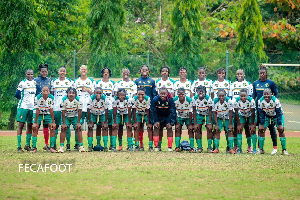The West Africa Program Manager for UK Charity, Fauna and Flora International (FFI), Alison Mollon, has said her organization's support towards the proposed Tofala Hills Wildlife Sanctuary and other projects of the Cameroon NGO Environment and Rural Development Foundation (ERuDeF) is long-term.
She was speaking on Sunday, August 3rd 2014, during a meeting to officially welcome her back, after visiting some project sites of the NGO.
The aim of her visit was to have a one on one discussion with the villagers around the Tofala Hill Wildlife Sanctuary; to understand their needs so as to be able to seek funding for alternative livelihood projects for the villagers.
During her visit to Cameroon, Ms. Mollon visited some three villages around the proposed sanctuary including; Nkong, Bechati and Besali. Here, villagers expressed need for training and equipment in some livelihood activities like livestock farming (fish ponds, poultry, piggery and rearing of goats), food processing or transformation, petit trading, Craft work, palm oil production and oil mills, corn mill, Cassava mill, a cracking machine to process palm kennel, bread fabrication and a bakery, vehicles to transport economic goods to and from markets, production of basic necessities like, soap and body oil, etc.
They also asked for improved palm and cocoa seeds, fertilizers, pesticides as well as social amenities like roads, classrooms, electricity, and internet connection amongst others.
After listening to the villagers; hunters, women and youths groups, Alison Mollon promised to do her best in digging up funding for these livelihood projects, but clarified that FFI is a conservation organization, hence it might be difficult for her to get funding for social amenities like schools, hospitals, roads, electricity and the like.
She however pledged to link the people with organizations interested in funding social amenities while encouraging the villagers, especially the Fons, to keep the Cameroon government abreast with such needs, since according to her, it is the government's responsibility to ensure the socio- economic well being of the people.
Reacting to growing misconceptions in some of the villagers in Bechati that FFI and ERuDeF were out to take their land, which was their only source of livelihood, Alison explained to the people that they are only out to support them, create and improve on alternative livelihood activities, since it is government decision to make the Tofala Hills a protected area, given the presence of some threatened wildlife species like gorillas, chimpanzees and elephants.
Alison also expressed disappointment after visiting the oil mill ERuDeF donated to Besali village in 2012, given the poor level of maintenance. She exhorted the villagers to install a strong and capable management committee that would ensure the sustainability of their present and future donations. She cautioned the villagers to understand that sponsors would be discouraged to help them if they don't show prove of positive reception.
Prior to her trip to the Tofala forest area, the FFI West Africa Program Manger met with the Divisional Delegates of Forestry and Wildlife and of the Environment, Nature Protection and Sustainable Development Lebialem, Mboui Jacques and Kanyimi Ihimbru Charles, respectively.
The delegates both articulated appreciation saying that Alison's visit is indication of better days ahead, especially now that the Tofala file is already at the Prime Ministry of the Republic, pending signature. They also disclosed some of the problems they, as government officials have been facing since the commencement of the Tofala project.
The problems included how to convince villagers that the forest they depend so much on for farming and hunting, will soon become a government protected area, and the fact that villagers expect compensation of some kind before they leave the forest. They however revealed that thanks to frequent sensitization meetings held with the villagers, a majority of them now understand and are cooperating.
The two delegates pledged their support in ensuring the sustainable management of the Sanctuary, once it is gazetted. After the discussions, Ms. Mollon paid a courtesy visit to the Senior Divisional Officer for Lebialem, Seid Idrissou who was also visibly happy to have her around.
Speaking shortly after her tour, Ms. Alison Mollon said it was clear to her that ERuDeF staff have developed a good relationship with the various communities where they have worked and this is enabling the work to continue in the field.
'ERuDeF is a professional organization. I am especially impressed with the number of different projects going on across a wide scope of conservation interventions', said Alison. She was however concerned about the fact that the villagers and some government officials insist on getting some form of motivation before meeting with ERuDeF and funding partners like FFI.
'Although field teams often say they may give motivation (such as purchase of alcohol) from their own funds and not project funds, the message received by communities is the same. As there is now expectation amongst villagers that they will receive something, this will be a difficult habit to break.
However, it will be easier now than in the future and will have to be done at some point. In fact the longer the giving of motivation goes on, the higher the risk for ERuDeF as the difficulty of communities will become stronger; the longer the practice continues' Alison Mollon cautioned.
ERuDeF has been working in partnership with FFI over the past five years and this partnership, according to Miss Mollon won't be ending any time soon.
'Taking over from the former West Africa Program Manager, Daniel Pouakoyou, I think the partnership can yield much higher collaboration given that there are areas where it would be more beneficial to harmonize efforts like the case of Tofala. As someone also new to FFI, I am still learning where FFI can support ERuDeF beyond applied conservation in the field. However I am aware we have a strong Conservation Capacity and Development team who could be very beneficial to ERuDeF in the future and this is something I would like to develop' Alison disclosed.
The last part of her visit was in Yaounde, for talks with the Director of Wildlife and Protected areas and the Minister of Forestry and Wildlife.
Actualités Régionales of Tuesday, 19 August 2014
Source: erudef.org













